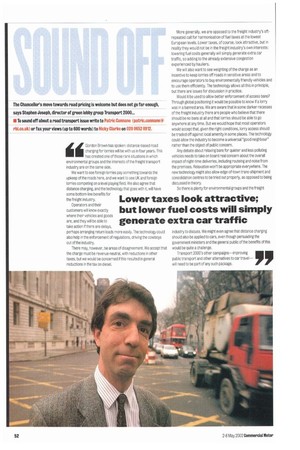6 Gordon Brown has spoken: distance-based road
Page 52

If you've noticed an error in this article please click here to report it so we can fix it.
charging for lorries will be with us in four years. This has created one of those rare situations in which environmental groups and the interests of the freight transport industry are on the same side.
We want to see foreign lorries pay something towards the upkeep of the roads here, and we want to see UK and foreign lorries competing on a level playing field. We also agree that distance charging, and the technology that goes with it, will have some bottom-line benefits for the freight industry.
Operators and their customers will know exactly where their vehicles and goods are, and they will be able to take action if there are delays, perhaps arranging return loads more easily. The technology could also help in the enforcement of regulations, driving the cowboys out of the industry.
There may, however, be areas of disagreement. We accept that the charge must be revenue-neutral, with reductions in other taxes, but we would be concerned if this resulted in general reductions in the tax on diesel. More generally, we are opposed to the freight industry's oftrepeated call for harmonisation of fuel taxes at the lowest European levels. Lower taxes, of course, look attractive, but in reality they would not be in the freight industry's own interests: lowering fuel costs generally will simply generate extra car traffic, so adding to the already extensive congestion experienced by hauliers.
We will also want to see weighting of the charge as an incentive to keep lorries off roads in sensitive areas and to encourage operators to buy environmentally friendly vehicles and to use them efficiently. The technology allows all this in principle, but there are issues for discussion in practice.
Would it be used to allow better enforcement of access bans? Through global positioning it would be possible to know if a lorry was in a banned area. We are aware that in some darker recesses of the freight industry there are people who believe that there should be no bans at all and that lorries should be able to go anywhere at anytime. But we would hope that most operators would accept that, given the right conditions, lorry access should be traded off against local amenity in some places. The technology could allow the industry to become a universal "good neighbour" rather than the object of public concern.
Any debate about relaxing bans for quieter and less polluting vehicles needs to take on board real concern about the overall impact of night-time deliveries, including routeing and noise from the premises. Relaxation won't be appropriate everywhere. The new technology might also allow edge-of-town trans-shipment and consolidation centres to be tried out properly, as opposed to being discussed in theory.
So there is plenty for environmental groups and the freight industry to discuss. We might even agree that distance charging should also be applied to cars, even though persuading the government ministers and the general public of the benefits of this would be quite a challenge.
Transport 2000's other campaigns—improving public transport and other alternatives to car travel— will need to be part of any such package.
































































































































































